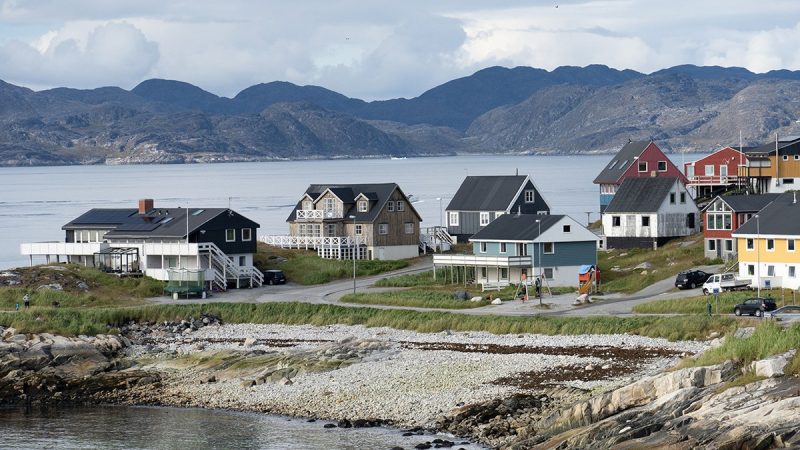As Donald Trump Jr. made a surprise visit to Greenland this week, President-elect Donald Trump’s rhetoric is getting more serious about buying Denmark’s Arctic territory.
The president-elect did not rule out using military coercion to gain control of Greenland in a press conference at Mar-a-Lago on Tuesday. ‘No, I can’t assure you on either of those two,’ Trump said, when asked if he would rule out using military or economic coercion to gain control of Greenland. ‘We need it for national security. That’s for the free world. I’m talking about protecting the free world,’ he continued.
Meanwhile, Denmark’s leaders remain adamant the Arctic territory is not for sale. ‘We have a clear interest in that it is the U.S. that plays a large role and not Russia or other countries. But Greenland is for the Greenlandic people,’ Denmark Prime Minister Mette Frederiksen told reporters on Tuesday.
Greenlanders will vote later this year if they want to stay a part of Denmark or not. The strategic island is at a territorial crossroads, as the U.S., China and Russia race to control the melting Arctic region.
Denmark and therefore Greenland are NATO allies. Article 5 of the NATO charter states that any military attack on a NATO ally requires a military response from the rest of the alliance.
‘I don’t think it is useful to talk about Article five implications because the United States is not actually going to use force on NATO ally. There are lots of reasons why that would never happen.’ Ian Bremmer, founder and president of the Eurasia Group, told Fox News.
‘It’s not that you don’t take what the president says seriously, because the fact that he’s making these threats does change how much American allies feel like they can count on the United States going forward… it does undermine leverage that the U.S. has in terms of international rule of law. It brings us closer to the, to the law of the jungle,’ Bremmer continued.
Trump first began talk of buying Greenland in 2019 because it has about a quarter of the world’s rare earth minerals, needed for all electronics, semiconductor manufacturing, the defense industry and the new clean energy economy.
Sherri Goodman, who served as the Pentagon’s first undersecretary of Defense for Environmental Security in the 1990s, recently wrote a book on the strategic and national security consequences of climate change titled, ‘Threat Multiplier: Climate, Military Leadership and the Fight for Global Security.’
Goodman has seen firsthand how important Greenland is to the U.S. military.
‘We’ve long had a military base in the north of Greenland to track former Soviet, now Russian incoming missiles or satellites. And because of climate change, navigation around Greenland and travel to Greenland is becoming more accessible,’ Goodman said.
Then-President Harry Truman wanted to buy Greenland after WWII to box out the Soviets from the Arctic. During the Cold War, the Arctic region was the most direct route for a strategic nuclear exchange between the U.S. and the USSR using long-range bombers and ballistic missiles. The GIUK Gap to the east of Greenland is a huge access point for Russia’s operations in the Atlantic Ocean. Greenland became a key location for early-warning networks and today is home to the northernmost U.S. military installation, Pituffik Space Force Base, which holds a substantial portion of the global network’s missile warning sensors and space surveillance sensors.
China’s ambitions in the Arctic have grown in recent years. In 2018, China laid out plans to build infrastructure and develop shipping lanes opened by climate change. State-owned businesses have put in bids to buy land in both Iceland and Greenland, so far with no luck.
Temperatures are rising in the Arctic four times faster than they are in the rest of the world, making access to the rare earth minerals it holds more accessible.
‘In this rush for resources, the U.S., NATO, and NATO allies want to ensure that China and Russia don’t access that. China has a history of using surrogate science and investigation as a way to gain access and learn about territories in the Arctic,’ Goodman said.
Pentagon deputy press secretary Sabrina Singh was asked about Greenland at a Defense Department briefing on Wednesday. ‘I’m certainly not going to get into hypotheticals. I think that’s for the incoming administration to speak to,’ Singh said.
Secretary of State Antony Blinken responded to a question about Greenland at a press conference in Paris on Wednesday. ‘The idea expressed about Greenland is obviously not a good one. But maybe more important, it’s obviously one that’s not going to happen. So we probably shouldn’t waste a lot of time talking about it,’ Blinken said.
